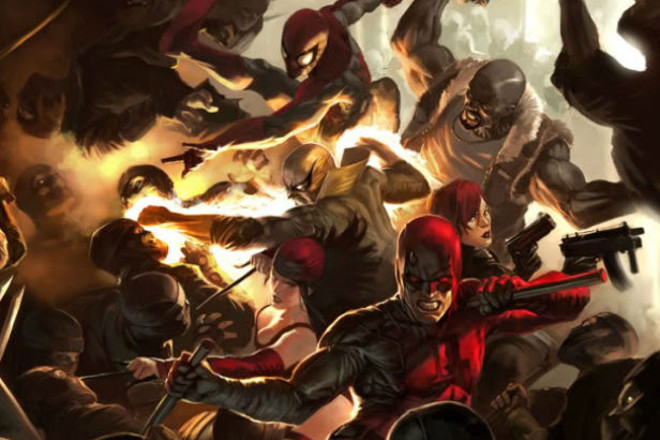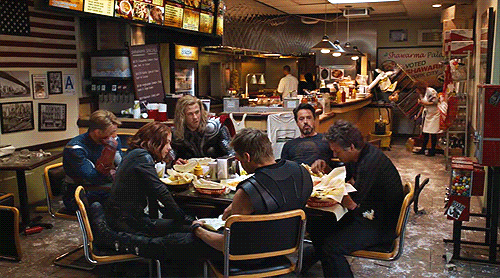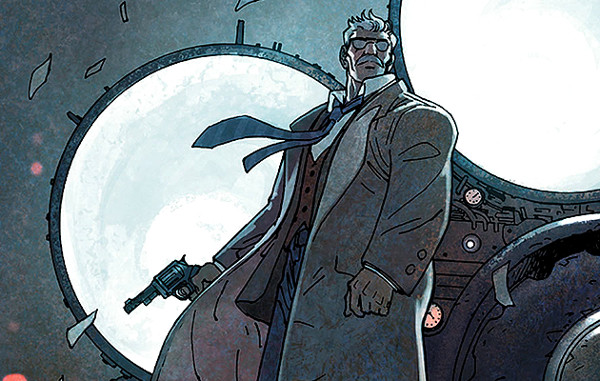Can The Upcoming Marvel And Netflix Hook-Up Compete With TV’s Best Shows?
With Marvel announcing they'll be joining forces with Netflix for four new live-action series, the small screen's set to be invaded with comic heroes. But will they be any good?

Superheroes are no longer content with just dominating your cinema screens; they’re now launching an all-out assault on television. The latest and most indicative example was Marvel’s announcement last week of four new live-action television series, as well as a mini-series, to be co-developed and released by the on-demand network, Netflix. Launching in 2015, each show will be a 13-episode series focusing on a different superhero, with the mini-series being a subsequent team up.
The shows will be based on a mixture of well-known and slightly less familiar superheroes, including:
Daredevil: Aka Matt Murdoch, a blind lawyer with super senses, known by most from Ben Affleck’s portrayal in 2003’s unanimously hated film.
Luke Cage: He used to go by the moniker Power Man, and has super strength as well as invulnerable skin, meaning knives, bullets, and pretty much anything else can’t make him bleed.
Iron Fist: Think Bruce Lee in Enter The Dragon if he could punch punches of pure chi energy.
Jessica Jones: She’s the former superheroine Jewel, who now works as a private detective.
The mini-series, The Defenders, will be a crossover team-up of all four, similar to The Avengers. In fact, all four heroes have at some stage been on the Avengers’ line-up, and knowing what we know about Marvel, these characters will most likely share the same universe as Marvel’s films.
–
Marvel’s meager offerings
Marvel’s major TV offering to date, Agents Of S.H.I.E.L.D., hasn’t been particularly impressive. Although it’s probably still too early to write-off just six episodes in, it’s been marred by inconsistent dialogue, grating references to hacktivists, some generally unlikable characters, and has disappointed pretty much every viewer it was chasing: those who expected action on par with The Avengers, those who expected Joss Whedon’s smart use of character, and even comic book fanboys, who don’t really get that excited every time the show makes an overt reference to Thor anyway. And no matter how much of an obscene budget Marvel throws at it — including special effects, jets and Samuel L. Jackson cameos — it’s hard to imagine how S.H.I.E.L.D. could be anything other than disposable in a world of Mad Men and Game Of Thrones.
One obvious factor for the poor response to S.H.I.E.L.D. is that it’s trying too hard to bring in a family audience by desperately clutching to the coattails of The Avengers‘ box office success. And it highlights something: following the company’s merger with Disney in 2009, the adult side of Marvel hasn’t really been seen. The irreverent tone set by Robert Downey Jr’s Iron Man seems to have saturated all its output, and anything serious, like Tony Stark’s alcohol dependency in Iron Man 2 or the symptoms of his post-traumatic stress disorder in Iron Man 3, has been met with lighthearted humour and references to shawarma.
This sort of thing is definitely evident in the just released Thor: The Dark World (don’t let the title fool you). It’s understandable: a feature film, especially a summer blockbuster kind of needs to appeal to the broadest audience possible. The Marvel movies are smart and also really self-aware in that sense; they know they’re dealing with superheroes, and it’s nice to be able to take your little niece or nephew to see The Avengers, an activity that’s probably inappropriate when dealing with The Dark Knight Rises or Man Of Steel. But if Marvel doesn’t break this trend — especially in their television endeavors, which generally cater to more niche markets — they’ll disappoint because they’re isolating not only a big demographic of viewers, but an entire facet of the Marvel universe.
–
Marvel’s shaking things up
One of the reasons why Marvel’s latest announcement is exciting is that the heroes they’re talking about are all street level: they’re based in Hell’s Kitchen in New York, they fight crime, and they’re gritty. Such territory lends itself to being adult and serious, and Marvel’s comics have a long history of being serious without being ironic, so why shouldn’t some of their films or TV properties reflect that? The release of the first trailer for X-Men: Days Of Future Past a couple of weeks ago was a great example of Marvel’s potential to create something with a more sombre tone (even though the film rights to X-Men now belong to Fox, the comics are a Marvel property).
Marvel obviously has other dark heroes, the most well-known being Blade, Daredevil and the Punisher, and in fact, Frank Miller — who’s mostly renowned for working on the Batman comics that became the seminal influence on Christopher Nolan’s The Dark Knight trilogy — did an ’80s run on Daredevil that was just as complex, brutal and multi-layered. That doesn’t mean that all four shows will have that exact tone, but hopefully they’ll shift from what Marvel’s already offering.
The fact that Disney is loosening the reigns on these new shows and letting Netflix do the development is another promising sign. Aside from releasing entire seasons at once, Netflix has the kinda freedom that was once only reserved for cable. It doesn’t have to worry about being appropriate for free-to-air TV, and it offers the show’s creators the freedom to try groundbreaking things. This can only mean good things for the comic book genre.
–
DC’s head start
The past few months have seen a frenzy of activity from DC Comics too, who’ve already announced their plans to diversify and strengthen their television properties. The same week that Marvel premiered S.H.I.E.L.D., DC and Fox announced the development of Gotham, a police procedural drama focusing on the early career of Commissioner Gordon as he deals with the criminals and killers of Gotham City in the days before Batman’s vigilantism. Gotham is to be penned by Bruno Heller, the creator of HBO’s Rome and The Mentalist.
Only a week later, it was revealed that NBC — yes, the ‘traditional’ network behind the recently batshit crazy Hannibal — is developing a series based on DC’s Hellblazer comics following John Constantine, the occult investigator some may dimly remember being played by Keanu Reeves in 2005’s exceptionally loose adaptation, Constantine. The television series will thankfully be unrelated, written by The Dark Knight and Man Of Steel screenwriter David S. Goyer and executively produced by Dexter showrunner, Daniel Cerone.
These two projects and the talent attached to both show a focus on more mature themes and drama. Alternatively, DC still has its more overt comic book properties on the screen with Arrow (based on DC’s Green Arrow) recently premiering its second season, which will see the introduction of Barry Allan, aka The Flash, and lead directly into an already in-development Flash spin-off.
So whether you’re excited or not, brace yourself. In the next couple of years, superheroes are coming to the small screen in a big way, and all we can do is wait and hope that these shows reach the heights we’ve come to expect from television’s current renaissance.
–
Paul Dalla Rosa sub-edits fiction for Farrago Magazine, co-hosts ‘The New Pollution’ podcast, and reads too many comics. Find him on twitter @PaulDallaRosa

